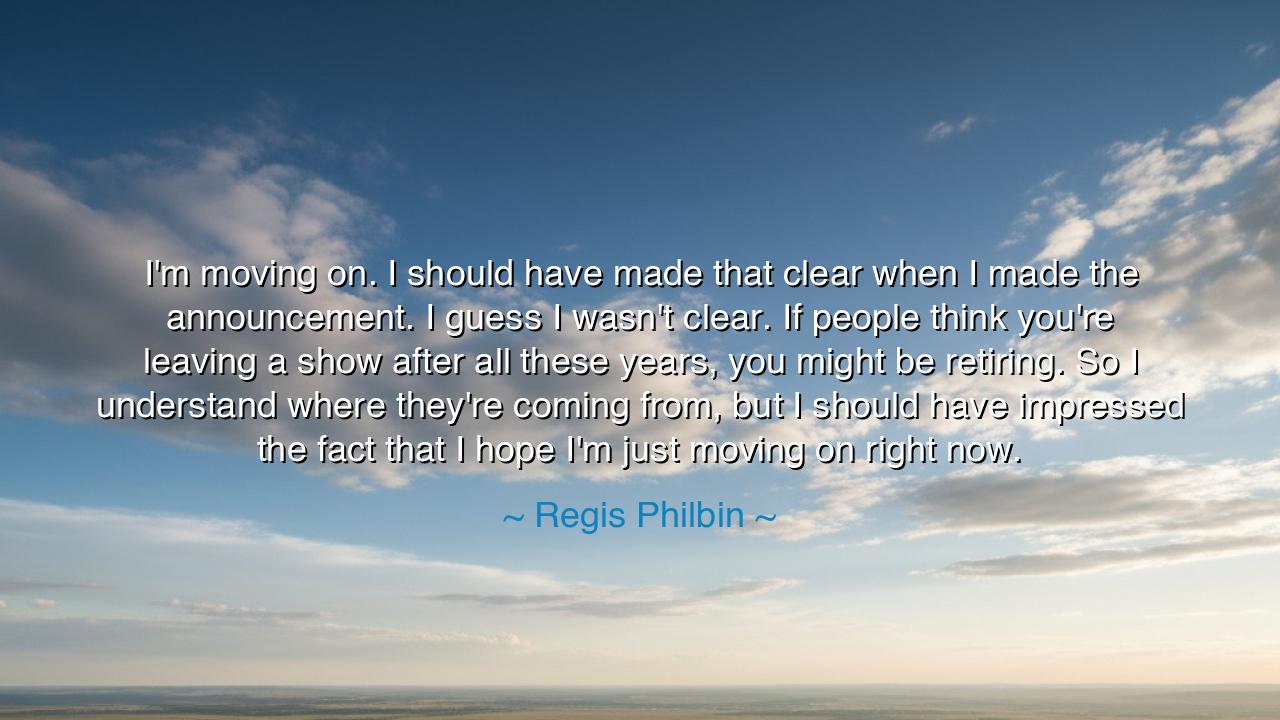
I'm moving on. I should have made that clear when I made the
I'm moving on. I should have made that clear when I made the announcement. I guess I wasn't clear. If people think you're leaving a show after all these years, you might be retiring. So I understand where they're coming from, but I should have impressed the fact that I hope I'm just moving on right now.






In the words of Regis Philbin we hear the noble cry of a man who stands at the crossroads of his journey, declaring with sincerity: “I’m moving on.” This is not the cry of retreat, nor the weary sigh of retirement, but the steady voice of one who knows that life itself demands motion. Philbin, after years of presence upon the stage of television, sought to make plain that his departure from one chapter was not the end of his story. He teaches us here that to move on is not to abandon, but to continue—an act not of resignation, but of courage.
From the earliest days of mankind, men and women have wrestled with the weight of endings. The Greeks knew it well, for when Odysseus returned home from Troy, he did not remain idle; though scarred and aged by his wanderings, he continued to rule, to guide, and to live with vigor. The end of one journey gave rise to another. So too does Philbin remind us: the closing of a role, even one held for long years, is not the extinguishing of the flame, but its passing into a new vessel. His words echo an ancient truth—that we must not mistake transition for conclusion.
Yet there is also humility in his admission: “I guess I wasn’t clear.” He acknowledges the misunderstanding of others, who thought his departure a retirement, a final bow. But wisdom lies in his response: not to scorn their misjudgment, but to understand it. How often do we, too, look upon the decisions of others and assume their meaning? How often do we see an end where there is only a turning? His gentleness toward the perceptions of others teaches us that clarity is a gift we must offer, and patience a virtue we must practice.
Consider the example of Cincinnatus, the Roman farmer who was called to be dictator in a time of peril. He led Rome to victory, then relinquished power to return to his plow. His departure from rule was not retirement from life, but a movement onward to another duty. His story, like Philbin’s, teaches us that endings are not failures nor farewells—they are simply transformations. The true measure of a man is not whether he stays in one place forever, but whether he carries his strength and character into each new season with dignity.
Philbin’s words also speak to the burden of expectation. After “all these years,” people saw his departure and assumed it to be final. Here lies a universal struggle: when one has stood in a place for long, the world resists imagining them elsewhere. This is why moving on is an act of quiet heroism, for it defies the chains of familiarity. To step away from what is known into what is not yet revealed demands courage, for it is easier to be trapped by habit than to walk into the unknown. His declaration is therefore not merely personal, but archetypal—a reminder that the soul thrives not in stillness, but in growth.
What lesson, then, shall we take? It is this: do not fear to say, “I’m moving on.” For moving on is the essence of life. The sun moves on from night to day, the seasons move on from birth to harvest, and man himself must move on from role to role, place to place, dream to dream. Hold no shame in transition, nor let the misunderstanding of others bind you. Speak clearly, act boldly, and walk forward with dignity, for the road ahead always holds new horizons.
Practically, this means embracing change when it calls. If a work, a role, or a season has run its course, do not cling to it out of fear. Instead, honor what has been, and then step forward. Announce your intentions with clarity, lest others mistake your courage for retreat. And when people misunderstand you, answer with patience, as Philbin did, remembering that perception belongs to them, but direction belongs to you.
Thus, my children, let us engrave these words upon our hearts: to move on is not to end, but to continue. As Regis Philbin declared with humility and strength, so must we declare in our own lives. When the time comes, rise from the seat you have long occupied, bow with gratitude, and step into the next chapter with hope. For the world belongs not to those who remain forever in one place, but to those who dare to keep moving forward.






AAdministratorAdministrator
Welcome, honored guests. Please leave a comment, we will respond soon